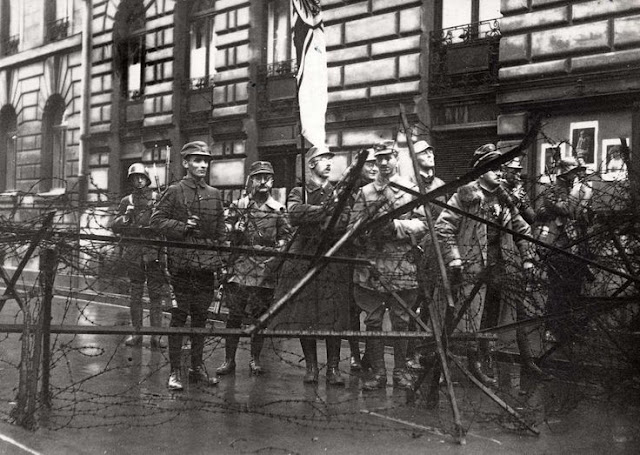Politics, Germany: Adolf Hitler attempts a coup against the government in Munich, Bavaria. He is accompanied by erstwhile Generalquartiermeister Erich Ludendorff, with whom he hoped to form a government. Others accompanying him included: Hermann Göring (Hermann Goering), Alfred Rosenberg, Rudolf Hess, Ernst Hanfstaengl, Ulrich Graf, Johann Aigner, Adolf Lenk, Max Amann, Max Erwin von Scheubner-Richter, Wilhelm Adam, Heinrich Himmler, and Rudolf Hess.
The coup is unsuccessful. Gustav Ritter von Kahr, a minor Bavarian functionary who had recently been appointed Staatskomissar (state commissioner) with plenary powers, is a presumed ally who turns out not to be. Sixteen people die during the march, which is resisted by government troops. Hitler is taken prisoner and winds up serving nine months in jail at Landsberg Prison. Goering is badly wounded in the "leg."
Ludendorff walks straight through the carnage and is unmolested by the troops. He leaves the party soon thereafter.
December 20, 1924: Hitler Leaves Prison
September 18, 1931: Geli Raubal Commits Suicide
November 8, 1932: Roosevelt is Elected
30 January 1933: Hitler Takes Office
February 27, 1933: Reichstag Fire
March 23, 1933: The Enabling Act
June 20, 1934: Hitler Plans the Night of the Long Knives
June 30, 1934: Night of the Long Knives
August 1, 1936: Opening of the Berlin Olympics
September 30, 1938: The Munich Agreement
November 9, 1938: Kristallnacht
August 1, 1939: Flight Tests of B-17 Flying Fortress
August 2, 1939: Einstein and the Atom Bomb
August 7, 1939: Goering Tries to Broker Peace
August 14, 1939: Hitler Decides To Attack Poland
August 15, 1939: U-Boats Put To Sea
August 16, 1939: Incident at Danzig
August 20, 1939: Battle of Khalkhin Gol
August 22, 1939: Hitler Tips His Hand
August 23, 1939: Ribbentrop-Molotov Pact
August 25, 1939: Hitler Postpones Invasion of Poland
August 27, 1939: First Jet Flight
August 31, 1939: The Gleiwitz Operation
2019
The coup is unsuccessful. Gustav Ritter von Kahr, a minor Bavarian functionary who had recently been appointed Staatskomissar (state commissioner) with plenary powers, is a presumed ally who turns out not to be. Sixteen people die during the march, which is resisted by government troops. Hitler is taken prisoner and winds up serving nine months in jail at Landsberg Prison. Goering is badly wounded in the "leg."
Ludendorff walks straight through the carnage and is unmolested by the troops. He leaves the party soon thereafter.
 |
| The defiant defendant, Adolf Hitler, with fellow defendants in the Putsch trial, including Gen. Ludendorff (left) and Ernst Röhm (right front). |
Pre-War
8-9 November 1923: Beer Hall PutschDecember 20, 1924: Hitler Leaves Prison
September 18, 1931: Geli Raubal Commits Suicide
November 8, 1932: Roosevelt is Elected
30 January 1933: Hitler Takes Office
February 27, 1933: Reichstag Fire
March 23, 1933: The Enabling Act
June 20, 1934: Hitler Plans the Night of the Long Knives
June 30, 1934: Night of the Long Knives
August 1, 1936: Opening of the Berlin Olympics
September 30, 1938: The Munich Agreement
November 9, 1938: Kristallnacht
August 1, 1939: Flight Tests of B-17 Flying Fortress
August 2, 1939: Einstein and the Atom Bomb
August 7, 1939: Goering Tries to Broker Peace
August 14, 1939: Hitler Decides To Attack Poland
August 15, 1939: U-Boats Put To Sea
August 16, 1939: Incident at Danzig
August 20, 1939: Battle of Khalkhin Gol
August 22, 1939: Hitler Tips His Hand
August 23, 1939: Ribbentrop-Molotov Pact
August 25, 1939: Hitler Postpones Invasion of Poland
August 27, 1939: First Jet Flight
August 31, 1939: The Gleiwitz Operation
2019

No comments:
Post a Comment